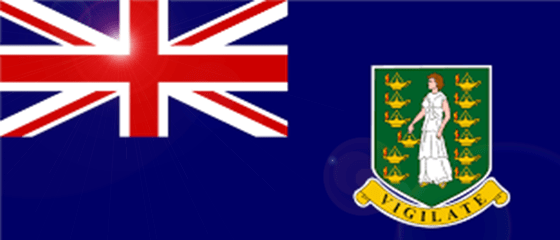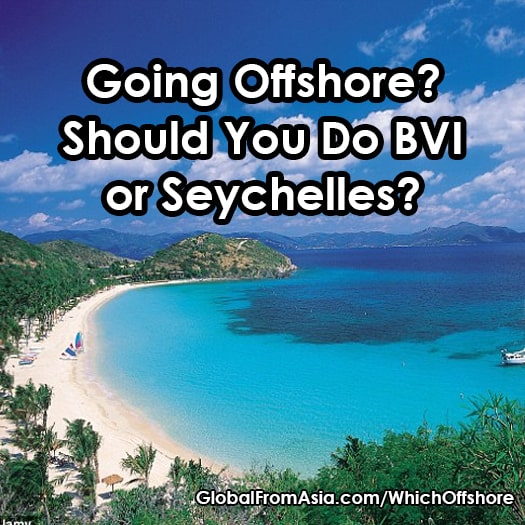
Looking to establish an offshore company? What is the first place you think of? Most likely BVI (British Virgin Islands), right. That is the classic used for many years. Today we discuss one a suggestion by Bridges Executive Centre here in Hong Kong called a Seychelles company. This another viable option that may even more more advisable to use if you are looking to go offshore.
You may also want to listen to a podcast episode with Fion on choosing a Hong Kong limited, of an offshore company such as BVI or Seychelles
as a supplement to this article. *Full disclosure, I do not have either a BVI or a Seychelles company, as an American citizen I do not feel comfortable doing it due to paperwork and regulations. If you were to open one, I would strongly encourage you do not hide it from the US government, and fully declare it*. If you do go ahead with this process, and are looking for an agency, Bridges is very helpful and helped me a lot in creating today’s post. I am an affiliate of their company and if you use code GFA when opening with them, you will receive a $1,000 HKD discount, and I will receive a commission, so thank you in advance.
Where Are These Offshore Locations Geographically?
Not sure if you like geography, or even care where these places are in the world, but I am a little curious about where these places are. Let’s look at the two locations on a map and some quick statistics about them
BVI – British Virgin Islands

The British Virgin Islands is not from US soil even though it has the name “British” in it, . BVI is in the Caribbean sea, east of Puerto Rico, with a population of only 155 square kilometers and a population of 21,000 people. I have a friend JP who bartends there and tells me he has met Richard Branson a few times, as Sir Richard has his own private island in the BVI. Pretty awesome right?
Map of BVI
Here is the map zoomed out pretty far so that you can see the neighboring regions.
Seychelles Islands

Seychelles is a newer destination for offshore registration, located is on the Indian Ocean. Once in the Indian Ocean, far to the Southwest, off the shores of East Africa, and south from India! Pretty wild location when you think about it, for me at least. More than three times the size BVI, with a land area of 455 square kilometers and a population of 85,000 people.
Map of Seychelles
As I just said, it is east of Africa and South of India – check out the map below. It is also “near” Maldives, one of the vacation destinations on my bucket list.
Which is More Popular, BVI or Seychelles?
I am sure the “keyword” in your mind for offshore business is BVI, and that makes the guess of which being more popular pretty easy. Yes, it is the British Virgin Islands. With the statistics being over 800,000 thousand companies registered in BVI since 1984! And with a population of 21,000 people, that means there are 38 companies for every one local resident of the island nation!
Given that, it also means everyone knows about BVI and it has built up a reputation of tax evasion. Seychelles is the “new kid on the block” and not on everyone’s radar. From what I have heard and read, it is becoming the new “standard” when registering an offshore company. We’ll go through that in the following points.

Taxation and Filing Requirements
Taxes are both zero (from these 2 governments) to companies who operate offshore. Just because they do not charge / collect taxes doesn’t mean you don’t have to pay taxes anywhere. It is the fact that these countries do not collect them for themselves. They also do not ask to see your accounting books and need minimal reporting requirements.
So for these points, both of these options are equal.
Privacy of Share Ownership
This is the concern I am sure tax evaders consider closely. Will the local government reveal my name and contact information to the public or to other governments who ask them? In a Hong Kong company there is a transparent online database, ICRIS, where you can check the background of a company and the owners. Transparency is a good thing. You can be confident to show you are an owner of this company and show the long standing positive history of your record keeping with Hong Kong company registry.
So both BVI and Seychelles are pretty private and secretive, a feature you would need if you’re looking to avoid taxes in other countries. But BVI has been agreeing with many major countries to share their data and give up the owners information of these offshore companies.
Seychelles does not show documentation and contact information with other country governments. You can say protecting or shielding these offshore companies. For how long, no one knows. I believe that there will be more and more transparency over time and sooner or later everything will be public and available. This is because the crackdown exposing money laundering and terrorist groups using offshore companies to do their dirty business. Keep this in the back of your mind. I’m not saying you’re a terrorist, but by hiding your identity you’re in the same class as far as first world governments feel. If you are a resident or a citizen of a larger global economy who is looking for all accounts and assets of its residents and/or citizens – don’t try to hide.
Privacy from Government or from General Public?
Privacy is two things, privacy for tax purposes, or privacy from the general public. While I am not a fan of either, let’s break these down.
One would want privacy from a government for tax reasons. you do not want them to know you have this company and this bank account and other assets. You need to trust that the place where you register your company never reveals to this government that you want to hide from. The risk is that if someday that government complies with other governments and shares data. Then you’re exposed and will face massive penalties.
Privacy from the general public means that you don’t want people in “real life” to find you’re an owner. This can be some rather shady things like you do not want your wife to find it when you get divorced – so she can’t take half of it. You may also want to setup this offshore company so that your business partners in a current company do not see you as competing with them. I have heard of people who setup an offshore company to compete with themselves. Sounds crazy, but the logic is that maybe you own 100% of the offshore company where in the other company you’re a minority shareholder. Another reason is your suppliers or customers can’t find out who is the real owner of the company. Maybe you are buying or selling from yourself in various corporate structures.
It can get pretty complicated, and pretty shady – so you do not want to get expose that you are the owner.
Or, maybe you genuinely want to keep your privacy. You do not want people to be able to so easily search your company name online and find you are the owner. Though I would wonder why you do not want to – as a business owner, you should be proud and stand behind the business you create.
Anyway, privacy from the public is about equal in both BVI and a Seychelles corporate structure.
Authorized Share Capital
For a BVI company, you need to issue 50,000 shares. If you need or want to register more than that amount of shares there will be extra fees. Compared that to Seychelles, there is no minimum or maximum amount of allocated shares. Anything goes in Seychelles.
Opening a Hong Kong Bank Account

So one thing you will learn about these offshore companies is that the countries do not have the best online banking. They are a bit behind on the technical upswing of the current generation. You will most likely need to find another country to open your bank account as the director of this offshore company.
As I have said all along with this blog and podcast, Hong Kong’s online banking is amazing – in English, multi-currency. It is awesome. So many offshore company directors work towards getting a bank account here in Hong Kong. Keep in mind more and more sharing of banking and company ownership around the globe. Banks have been getting more weary to allow these kinds of offshore clients. Banks need to do more due diligence, for fear of getting massive lawsuits from countries like the United States of America.
There has been big crackdowns on HSBC for helping clients with money laundering and tax evasion. Some say that is it the responsibility to know so deeply what their clients are doing? Well, major governments believe they should know their clients, KYC – know your customer, is a big one. This is not just for taxes, but also to fight against terrorism. Terrorist organizations create these offshore companies. Once with nice online banking access, they are then are able to pay their team around the world for doing…horrible things. I don’t feel like going into it here – but you can only imagine some horrible terrorist acts we have seen recently. Many times it is these offshore companies paying them out for these deeds.
So because BVI has become so popular over the years, many banks are not as open to them when opening a bank account there. Seychelles, I am told by Bridges is much easier to open a bank account with. This is for the time being, and let’s see how the world’s turn of events goes.
Notice for American Citizens & Residents of Most Major Economies
Today’s post is a sensitive one (and one I left in my drafts for a while before determining to publish). Decide to go forward with an offshore company? You need to remember about your obligations to your country of “origin” or residency. Let me break down Americans and then the “rest of the Western” world below.
Americans Pay Global Taxes By Being a Citizen
As an American citizen, we have to pay taxes to the IRS even if we do not live there. Whether you become a resident of Hong Kong or China or Thailand, so long as you hold a US passport, you need to file taxes there. There is no going around this. Think creating an offshore company in Seychelles is going to help you evade tax? I can bring on some future podcasts with Americans who got caught when the IRS got access to the BVI database.
If you’re an American, even if you never go back, so long as you hold a US passport you are responsible to file your taxes just like a citizen who lives there year round. Whether you or I like this is irrelevant, it is getting more and more serious and the IRS is increasing its reach around the globe.
Most Other Countries Tax Based On Residency

So many Europeans ask if this is OK. They may not be living in their home country. So the way most other countries work is that you pay taxes to them if you are a resident of the country. Residents qualify for the healthcare system, schooling system, police, emergency services, military protection, etc. You need to contribute your fair share of taxes to maintain the system. If you do not live in your home country and become a resident somewhere else (I.e. Southeast Asia) then you do not need to pay taxes to your home country. Your home country government assumes that you are paying taxes to the new country of your residency. That country will be responsible for the basic needs of a human being living in a government.
But a lot of people don’t realize, or forget, to change their residency in their home country. Then you still are responsible to pay taxes there.
Mention Again – Talk To A Tax Professional in Your Home Country & State
This is an extremely sensitive topic, I am using my real name – Michael Michelini – to write these posts. Its not a pen name, and I’m an American citizen – on a public blog. Think you understand my position. Use this advice at your own discretion and please consult with a tax accountant or tax attorney in your home country and state. They should be familiar with how your international tax laws are in your specific situations.
Any feedback or conflicting information I have here, I would love to hear it. I will try my best to keep this post fresh and up to date.
Will You Go Offshore?
So I hope today’s post gives you some ideas of offshore companies, the pros and cons. We covered the differences between the two more common places to do it – BVI or Seychelles. Again, I am affiliate partner of Bridges Executive Centre in Hong Kong and this article was based on their article with their encouragement and support. I of course put my own spin and commentary on here.
If you are considering going forward with an offshore company and are looking for an agency you can trust – give Bridges a try. They have tons of experience and can also help with bank introductions. If you mention GFA in your application process you will receive a $1,000 Hong Kong dollar discount. I will also earn a commission, so thank you in advance.
Any questions or comments – I welcome them below! Good luck in all our international business endeavors, the world is global now.

